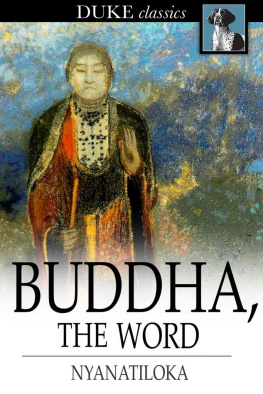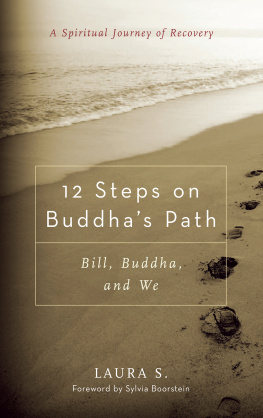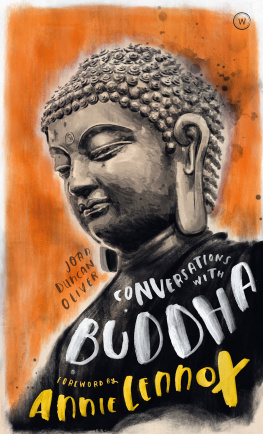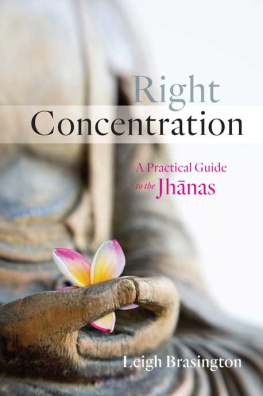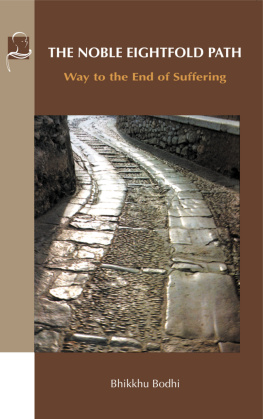Bhikkhu Nyanatiloka - Buddha, the word: the eightfold path
Here you can read online Bhikkhu Nyanatiloka - Buddha, the word: the eightfold path full text of the book (entire story) in english for free. Download pdf and epub, get meaning, cover and reviews about this ebook. City: Garfield Heights;Ohio, year: 2012, publisher: Duke Classics, genre: Science. Description of the work, (preface) as well as reviews are available. Best literature library LitArk.com created for fans of good reading and offers a wide selection of genres:
Romance novel
Science fiction
Adventure
Detective
Science
History
Home and family
Prose
Art
Politics
Computer
Non-fiction
Religion
Business
Children
Humor
Choose a favorite category and find really read worthwhile books. Enjoy immersion in the world of imagination, feel the emotions of the characters or learn something new for yourself, make an fascinating discovery.
- Book:Buddha, the word: the eightfold path
- Author:
- Publisher:Duke Classics
- Genre:
- Year:2012
- City:Garfield Heights;Ohio
- Rating:4 / 5
- Favourites:Add to favourites
- Your mark:
- 80
- 1
- 2
- 3
- 4
- 5
Buddha, the word: the eightfold path: summary, description and annotation
We offer to read an annotation, description, summary or preface (depends on what the author of the book "Buddha, the word: the eightfold path" wrote himself). If you haven't found the necessary information about the book — write in the comments, we will try to find it.
Buddha, The Word discusses the teachings of Guatama Buddha. The Four Noble Truths teach that suffering is inherent in life, but that through acknowledging the origins of suffering and following the Eightfold Path, suffering can be ceased. The Eightfold path teaches how understanding, thought, speech, action, livelihood, effort, mindfulness and concentration can all be undertaken with rightness.
Buddha, the word: the eightfold path — read online for free the complete book (whole text) full work
Below is the text of the book, divided by pages. System saving the place of the last page read, allows you to conveniently read the book "Buddha, the word: the eightfold path" online for free, without having to search again every time where you left off. Put a bookmark, and you can go to the page where you finished reading at any time.
Font size:
Interval:
Bookmark:

The Eightfold Path
From a 1927 edition
ISBN 978-1-62011-711-8
Duke Classics
2012 Duke Classics and its licensors. All rights reserved.
While every effort has been used to ensure the accuracy and reliability of the information contained in this edition, Duke Classics does not assume liability or responsibility for any errors or omissions in this book. Duke Classics does not accept responsibility for loss suffered as a result of reliance upon the accuracy or currency of information contained in this book.
THUS has it been said by the Buddha, the Enlightened One: It isthrough not understanding, not realizing four things, that I,Disciples, as well as you, had to wander so long through this round ofrebirths. And what are these four things? They are the Noble Truthof Suffering, the Noble Truth of the Origin of Suffering, the NobleTruth of the Extinction of Suffering, the Noble Truth of the Path thatleads to the Extinction of Suffering. As long as the absolutely true knowledge and insight as regardsthese Four Noble Truths was not quite clear in me, so long was I notsure, whether I had won that supreme Enlightenment which isunsurpassed in all the world with its heavenly beings, evil spiritsand gods, amongst all the hosts of ascetics and priests, heavenlybeings and men. But as soon as the absolutely true knowledge andinsight as regards these Four Noble Truths had become perfectlyclear in me, there arose in me the assurance that I had won thatsupreme Enlightenment unsurpassed. And I discovered that-profound truth, so difficult to perceive,difficult to understand, tranquilizing and sublime, which is not to begained by mere reasoning, and is visible only to the wise. The world, however, is given to pleasure, delighted with pleasure,enchanted with pleasure. Verily, such beings will hardly understandthe law of conditionality, the Dependent Origination of every thing;incomprehensible to them will also be the end of all formations, theforsaking of every substratum of rebirth, the fading away ofcraving; detachment, extinction, Nirvana. Yet there are beings whose eyes are only a little covered with dust:they will understand the truth.
WHAT, now, is the Noble Truth of Suffering? Birth is suffering; Decay is suffering; Death is suffering;Sorrow, Lamentation, Pain, Grief, and Despair, are suffering; not toget what one desires, is suffering; in short: the Five Groups ofExistence are suffering. What, now, is Birth? The birth of beings belonging to this or thatorder of beings, their being born, their conception and springing intoexistence, the manifestation of the groups of existence, the arisingof sense activity-this is called Birth. And what is Decay? The decay of beings belonging to this or thatorder of beings; their getting aged, frail, grey, and wrinkled; thefailing of their vital force, the wearing out of the senses-this iscalled Decay. And what is Death? The parting and vanishing of beings out of thisor that order of beings, their destruction, disappearance, death,the completion of their life-period, dissolution of the groups ofexistence, the discarding of the body-this is called Death. And what is Sorrow? The sorrow arising through this or that lossor misfortune which one encounters, the worrying oneself, the state ofbeing alarmed, inward sorrow, inward woe-this is called Sorrow. And what is Lamentation? Whatsoever, through this or that loss ormisfortune which befalls one, is wail and lament, wailing andlamenting, the state of woe and lamentation this is calledLamentation. And what is Pain? The bodily pain and unpleasantness, the painfuland unpleasant feeling produced by bodily contact-this is called Pain. And what is Grief? The mental pain and unpleasantness, the painfuland unpleasant feeling produced by mental contact-this is calledGrief. And what is Despair? Distress and despair arising through this orthat loss or misfortune which one encounters, distressfulness, anddesperation-this is called Despair. And what is the "suffering of not getting what one desires?" Tobeings subject to birth there comes the desire: "O that we were notsubject to birth! O that no new birth was before us!" Subject todecay, disease, death, sorrow, lamentation, pain, grief, anddespair, the desire comes to them: "O that we were not subject tothese things! O that these things were not before us!" But this cannotbe got by mere desiring; and not to get what one desires, issuffering.
And what, in brief, are the Five Groups of Existence? They areCorporeality, Feeling, Perception, (mental) Formations, andConsciousness. Any corporeal phenomenon, whether one's own or external, gross orsubtle, lofty or low, far or near, belongs to the Group ofCorporeality; any feeling belongs to the Group of Feeling; anyperception belongs to the Group of Perception; any mental formationbelongs to the Group of Formations; all consciousness belongs to theGroup of Consciousness. (Our so-called individual existence is in reality nothing but a mereprocess of these "bodily and mental" phenomena, which since immemorialtimes was going on before one's apparent birth, and which also afterdeath will continue for immemorial periods of time. In thefollowing, we shall see that these five Groups, or Khandhas-eithertaken separately, or combined-in no way constitute any real"Ego-entity," and that no Ego-entity exists apart from them, and hencethat the belief in an Ego-entity is merely an illusion. Just as thatwhich we designate by the name of "chariot," has no existence apartfrom axle, wheels, shaft, and so forth: or as the word "house" ismerely a convenient designation for various materials put togetherafter a certain fashion so as to enclose a portion of space, and thereis no separate house-entity in existence:-in exactly the same way,that which we call a "being," or an "individual," or a "person," or bythe name is nothing but a changing combination of physical andpsychical phenomena, and has no real existence in itself.)
What, now, is the Group of Corporeality? It is the four primaryelements, and Corporeality derived from them. And what are the four primary elements? They are the SolidElement, the Fluid Element, the Heating Element, the VibratingElement. (The four elements, or-to speak more correctly-the four elementaryqualities of matter, may be rendered in English as: Inertia, Cohesion,Radiation, and Vibration. The twenty-four corporeal phenomena which depend upon them are,according to the Abhidharma: eye, ear, nose, tongue, body, visibleform, sound, odor, taste, masculinity, femininity, vitality, organof thinking, gesture, speech, space (cavities of ear, nose, etc.),agility, elasticity, adaptability, growth, duration, decay,variability, change of substance.) 1. What, now, is the Solid Element? The solid element may be one'sown, or it may be external. And what is one's own solid element? Thedependent properties, which on one's own person and body are hardand solid, as the hairs of head and body, nails, teeth, skin, flesh,sinews, bones, marrow, kidneys, heart, liver, diaphragm, spleen,lungs, stomach, bowels, mesentery, excrement, or whatever otherdependent properties which on one's own person and body are hard andsolid-this is called one's own solid element. Now, whether it be one'sown solid element, or whether it be the external solid element, theyare both only the solid element. And one should understand, according to reality, and true wisdom:"This does not belong to me; this am I not; this is not my Ego." 2. What, now, is the Fluid Element? The fluid element may beone's own, or it may be external. And what is one own fluid element?The dependent properties, which on one's own person and body arewatery or cohesive, as bile, phlegm, pus, blood, sweat, lymph,tears, semen, spit, nasal mucus, oil of the joints, urine orwhatever other dependent properties which on one own person and bodyare watery or cohesive-this is called one's own fluid element. Now,whether it be one's own fluid element, or whether it be the externalfluid element, they are both only the fluid element. And one should understand, according to reality, and true wisdom:"This does not belong to me; this am I not; this is not my Ego." 3. What, now, is the Heating Element? The heating element may be oneown, or it may be external. And what is one's own heating element? Thedependent properties, which on one's own person and body are heatingand radiating, as that whereby one is heated, consumed, scorched,whereby that which has been eaten, drunk, chewed, or tasted, isfully digested; or whatever other dependent properties, which on one'sown person and body are heating and radiating this is called one's ownheating element. Now, whether it be one's own heating element, orwhether it be the external heating element, they are both only theheating element. And one should understand, according to reality, and true wisdom:"This does not belong to me; this am I not; this is not my Ego." 4. What, now, is the Vibrating Element? The vibrating element may beone's own, or it may be external. And what is one's own vibratingelement? The dependent properties, which on one's own person andbody are mobile and gaseous, as the upward-going and downward-goingwinds; the winds of stomach and intestines; in-breathing andout-breathing; or whatever other dependent properties, which onone's own person and body are mobile and gaseous-this is calledone's own vibrating element. Now, whether it be one's own vibratingelement, or whether it be the external vibrating element, they areboth only the vibrating element. And one should understand, according to reality, and true wisdom:"This does not belong to me; this am I not; this is not my Ego." Just as one calls "hut" the circumscribed space which comes to be bymeans of wood and rushes, reeds, and clay, even so we call "body"the circumscribed space that comes to be by means of bones and sinews,flesh and skin.
Font size:
Interval:
Bookmark:
Similar books «Buddha, the word: the eightfold path»
Look at similar books to Buddha, the word: the eightfold path. We have selected literature similar in name and meaning in the hope of providing readers with more options to find new, interesting, not yet read works.
Discussion, reviews of the book Buddha, the word: the eightfold path and just readers' own opinions. Leave your comments, write what you think about the work, its meaning or the main characters. Specify what exactly you liked and what you didn't like, and why you think so.

